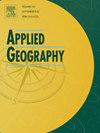Territorial impacts of the monoculture-based agri-food industry: Comparative analyses on two continents
IF 4
2区 地球科学
Q1 GEOGRAPHY
引用次数: 0
Abstract
Agri-food industrial complexes have undergone rapid transformations in recent decades, resulting in significant territorial impacts in the regions where they are concentrated. Economic and social globalization has given rise to a global consumer class with increasingly homogenized habits, driving up demand for certain agri-food products—both for direct consumption and as inputs in intermediate stages of the value chain. Technological advancements have further intensified crop yields, making agricultural investments more attractive to financial capital. This paper explores this process through two paradigmatic cases: soybean cultivation in the Pampas region of Argentina and olive farming in the southern Iberian Peninsula. These cases illustrate how agribusiness is reshaping traditional agro-industrial complexes, affecting economic, financial, technological, and institutional structures. Despite these transformations, production remains primarily geared toward international markets. The methodological approach used is the case study, framed within an evolutionary perspective of endogenous development theories. The analysis of the development of these two monoculture-based agri-food industries highlights how technological innovations evolve within specific institutional and socioeconomic contexts, driving progressive changes that model localized activities.

以单一栽培为基础的农业食品工业的地域影响:两大洲的比较分析
近几十年来,农业食品工业综合体经历了迅速的转变,在其集中的地区产生了重大的地域影响。经济和社会全球化产生了一个习惯日益同质化的全球消费阶层,推动了对某些农产品的需求——无论是直接消费还是作为价值链中间阶段的投入。技术进步进一步提高了作物产量,使农业投资对金融资本更具吸引力。本文通过两个典型案例探讨了这一过程:阿根廷潘帕斯地区的大豆种植和伊比利亚半岛南部的橄榄种植。这些案例说明了农业综合企业如何重塑传统的农工综合体,影响经济、金融、技术和制度结构。尽管有这些转变,生产仍然主要面向国际市场。使用的方法方法是案例研究,在内生发展理论的进化观点框架内。对这两种以单一栽培为基础的农业食品工业发展的分析强调了技术创新如何在特定的制度和社会经济背景下发展,推动了以本地化活动为模式的渐进式变化。
本文章由计算机程序翻译,如有差异,请以英文原文为准。
求助全文
约1分钟内获得全文
求助全文
来源期刊

Applied Geography
GEOGRAPHY-
CiteScore
8.00
自引率
2.00%
发文量
134
期刊介绍:
Applied Geography is a journal devoted to the publication of research which utilizes geographic approaches (human, physical, nature-society and GIScience) to resolve human problems that have a spatial dimension. These problems may be related to the assessment, management and allocation of the world physical and/or human resources. The underlying rationale of the journal is that only through a clear understanding of the relevant societal, physical, and coupled natural-humans systems can we resolve such problems. Papers are invited on any theme involving the application of geographical theory and methodology in the resolution of human problems.
 求助内容:
求助内容: 应助结果提醒方式:
应助结果提醒方式:


